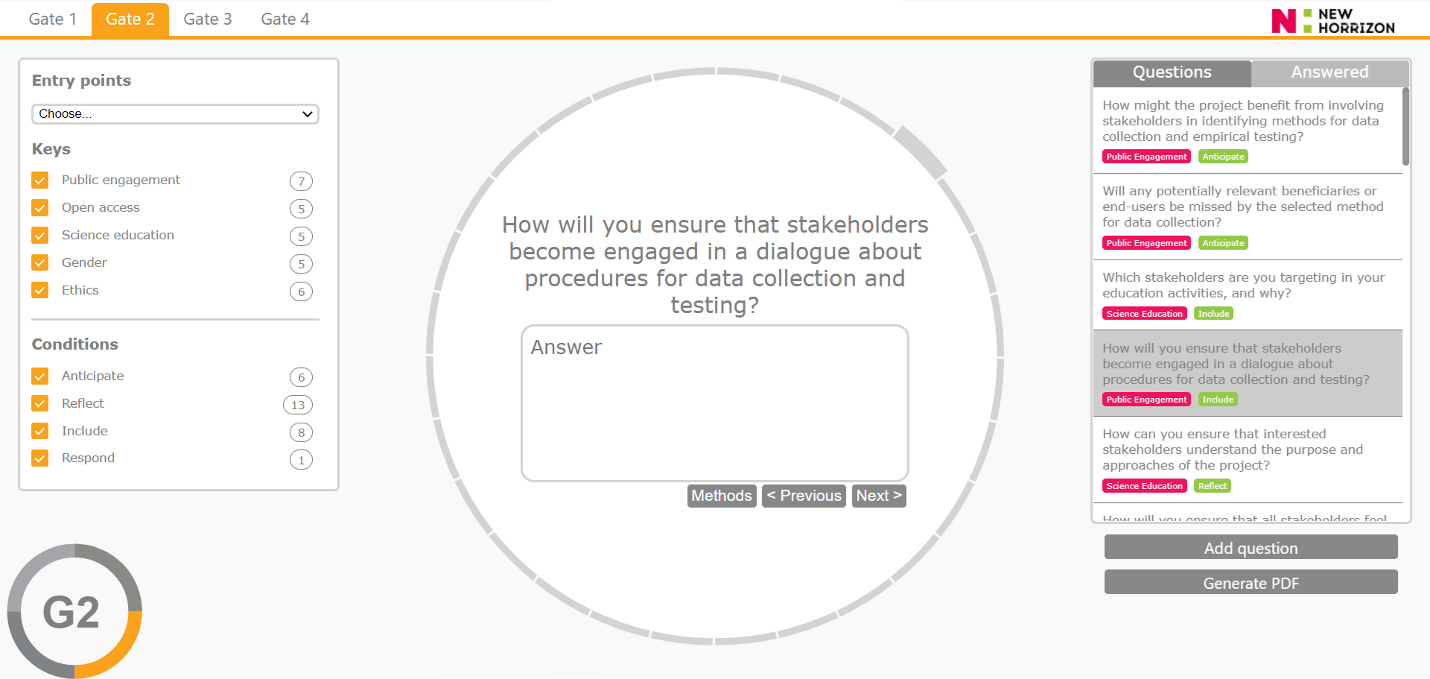We Developed a Tool to Make Responsible Research and Innovation Easier
The ultimate aim of research funders is for their research to benefit society. Hence, they require applicants to reflect on issues such as ethics, gender, open science, public engagement and science education. The European Commission uses the term ‘Responsible Research and Innovation’ (RRI) to refer to practices that address these issues. As such, RRI stands in for one of many processes aligning research and innovation to societal values, needs and expectations. Yet, many researchers struggle to understand what RRI entails and how they can incorporate it into their work. Our Societal Readiness Thinking Tool supports funders and researchers to include reflections on aspects of open and responsible R&I practices in their calls and applications, respectively.
Consider Kate, a computer scientist specializing in algorithms for biometric tools. She found a call for a project on border management in Horizon Europe. The European Commission intends for the research to ‘contribute to the implementation of the European Border Surveillance System and the development of tools and methods for Integrated Border Management.’ This sparks Kate’s interest, as she worked on such tools in a Horizon 2020 project. The final Technology Readiness Level the commission expects is 5-7: ‘Technical Demonstration.’ Kate understands the final product might be only one or two steps away from implementation. This is an exciting opportunity to have a real impact! There is just one question Kate asks herself:
‘Throughout our Horizon 2020 project we paid so much attention to Responsible Research and Innovation to ensure societal acceptance of the technology that we were developing. Biometrics is quite a sensitive issue …but now this call doesn’t mention anything about ethics?!… Yet, its result should be a prototype for a border management tool. Should we just focus on the technical aspects?’
Recognizing the challenge of systematically thinking about societal readiness, we aimed to create an accessible framework for researchers to support musings like Kate’s. Our Societal Readiness Thinking Tool seeks to be a bridging resource between funders and the researchers who do not necessarily have prior experience or exposure to concerns like those under the banner of Responsible Research and Innovation.

Although the tool was developed with researchers in mind, we anticipate it will help funders integrate societal and technical issues in their funding calls. At the end of the day, it may be the call text itself that really gets researchers thinking more about developing their research in ways that respond to societal concerns. This is where funders can do more. The recent batch of Horizon Europe calls have dismally few references to societal and ethical concerns in the texts. Most simply ask for technological fixes to pre-supposed problems without any reflection on whether and how societal issues might be important to include. This represents not least a degree of moral hazard, but also a waste of the resources that went into developing RRI frameworks.
Why should funders care about integrating societal concerns in their calls? As Roger Strand argues in more detail, there are at least three arguments. First, it gives society a voice to (re)shape the trajectory of science, increasing the likelihood that we arrive at desired destinations. Second, it involves society in the actual research process, which contributes to trust in science and increase the adoption of its achievements. Third, it stimulates collaboration within science and between science and society, which is crucial for the grand challenges, or missions, society faces.
To include societal considerations in research, the tool addresses five Responsible Research and Innovation keys: ethics, gender, open access, public engagement, and science education. The tool also integrates four process-focused responsible innovation dimensions: anticipating (potential impacts), including (diverse perspectives), reflecting (on motivations and assumptions), and responding (based on new information from these three activities).

In a curated experience, the tool translates these policy and scientific concepts into relatable questions users can answer to reflect on projects. No matter what phase the research they think about is in. No matter how much they know about responsible research and innovation required. No matter whether they are a funder, a researcher, or a consultant. Examples of such questions include: ‘Which actions will be taken to ensure diverse perspectives on the potential ethical issues arising in your project?’ and ‘Who might be excluded from the benefits of the project, and how will you address this?’ Ideally, users meet with colleagues, stakeholders, and potential end-users to think through answers together. Answering such questions not only helps researchers carry out more usable research, but also helps funders demonstrate they are pushing the boundaries of what it means to support excellent science with and for society.
As the European Commission states on its tenders page for Horizon Europe:
‘Such framework should be accompanied by a solid scientific model that connects future technologies with their future use. This should allow to identify how future civil security technology, research, innovation and industrial trends impact, influence and shape future threats and security capabilities, taking into account contextual aspects. These may include ethical, legal, societal, economic, geopolitical, environmental or industrial aspects […]’
If funders include a link to the Societal Readiness Level Thinking Tool, or any other previous Commission investments like it, then Kate would have a much easier time starting to think through these issues, connect with people with complementary skills to augment project proposals accordingly, and generate excellent research that advances TRLs while balancing social and ethical concerns.



























































































